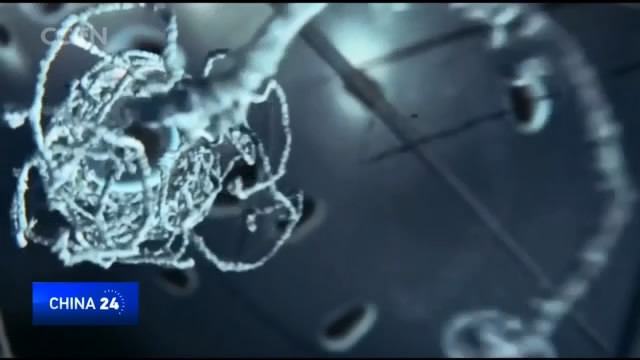
21:04, 28-Apr-2018
Stem Cell Breakthrough: Chemical mix a new method for stem cell creation
03:02

For over 20 years, stem cell research has provided clues to cures for many diseases and injuries. Scientists have so far mostly harvested those cells from human sources, like embryos or adult tissue, which has caused controversy. But experts say they now have a way to create stem cells right in a lab. CGTN's Mark Fontes reports.
Stem cells might well be the most powerful cells in our bodies. And when harvested and reinjected into humans, they help regrow and regenerate other cells damaged or lost due to illness and injury.
LI DONGWEI LEAD RESEARCHER, GUANGZHOU INSTITUTE OF BIOMEDICINE AND HEALTH "For example, adult cells can be extracted from a patient that has a liver disease, then converted into stem cells which can grow a new liver. That's called Autotherapy."
At the Guangzhou Institute of Biomedicine and Health in southern China, scientists say years of research is paying off. They're working with a new, efficient way to create stem cells.
DR. DUANQIAN PEI DIRECTOR, GUANGZHOU INSTITUTE OF BIOMEDICINE AND HEALTH "The best way is to use chemicals. All you have to do is culture the cells in different culture media, and hopefully you can come up with the same feat."
That feat is converting somatic cells, virtually any cell in an adult body, into pluripotent stem cells, the type that can be used in a multitude of ways. The older, less functional cells are soaked in a cocktail of ten different chemicals, which converts them into the valuable stem cells.
LIU JING RESEARCHER, GUANGZHOU INSTITUTE OF BIOMEDICINE AND HEALTH "We call it the magic potion. It's a synergy of different compounds. Some of the compounds can change our DNA, some of them change cell signals. They work together."
Doctor Pei says past stem cell creation methods involved experiments using viruses, but the chemical method is much more practical. He adds that we should be consuming one of the substances in the 'cocktail' regularly.
DR. DUANQIAN PEI DIRECTOR, GUANGZHOU INSTITUTE OF BIOMEDICINE AND HEALTH "Vitamin C works by reducing the aging effect of the cell."
MARK FONTES GUANGZHOU "For years now, scientists in labs like this one in Guangzhou have been able to sort of turn back the clock on somatic cells with the help of stem cell experiments. The question remains though, as time goes on, will these same age-slowing, or even age-reversing processes work, when tested in us?"
DR. DUANQIAN PEI DIRECTOR, GUANGZHOU INSTITUTE OF BIOMEDICINE AND HEALTH "That's a whole new science of human physiology that we have to work with. I think that's far more complicated, and will require further investment and careful planning."
The team does say the chemical method for stem cell creation will help cure life-threatening illnesses sooner than most people think.
LI DONGWEI LEAD RESEARCHER, GUANGZHOU INSTITUTE OF BIOMEDICINE AND HEALTH "In-vitro, we've been able to create insulin that can probably cure diabetes. Also, one stem cell experiment in Japan helped restore a patient's vision."
LIU JING RESEARCHER, GUANGZHOU INSTITUTE OF BIOMEDICINE AND HEALTH "Looking ahead, we will try to make the entire process much faster, more efficient and much easier, by creating better cooperation between the chemical molecules.
The team said trying their current approach in humans could trigger serious side effects, like cancer. But they agree that continuing the research will develop safer methods for stem cell treatments, which will become affordable for the average patient. Mark Fontes, CGTN, Guangzhou.

SITEMAP
Copyright © 2018 CGTN. Beijing ICP prepared NO.16065310-3
Copyright © 2018 CGTN. Beijing ICP prepared NO.16065310-3